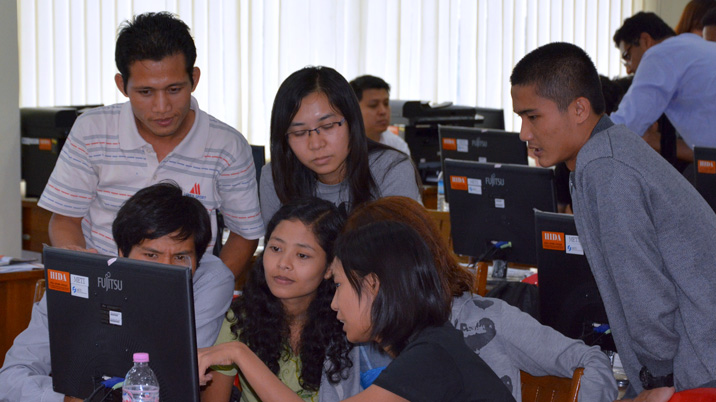For the people of Myanmar, the World Bank’s Open Development initiative has taken on a whole new meaning as the government continues to push forward with its people-centered reforms.
At a recent workshop held in Yangon to introduce this initiative, participants had big ideas for development. “We need data, on poverty and social change,” said Htong Kham, a student at the Yangon Education Center. “Data and information can help us get new ideas, to work with others to find a solution.”
Fellow student Nicki, who wants to study political science in Australia, said, “It’s my time to work for my country. We are changing, and politics is important to help the country develop.” Another student, Ko Zin believes the quality of teachers needs to be improved, and plans to study education and management in Hong Kong.
It is aspirations such as these that Open Development aims to support. Across the globe, there is increasing demand for greater transparency, accountability and governance. To meet this demand, the Bank’s data, research, information and analytical tools are now available on the internet free of charge. “Greater access to data and information will enable everyone to make better informed choices and decisions, to improve the lives of the people,” said Kanthan Shankar, the Bank’s Country Manager for Myanmar.
In the fast-transitioning country, participants needed no convincing of its potential. Over two days, more than 120 members of civil society organizations (CSOs), research institutes, government ministries as well as students gathered to explore the Bank’s website to discuss how data and information can help them tackle development challenges.
Many are data trailblazers in their own communities. Htaike Htaike Aung, who works for Myanmar ICT for Development, a local CSO, is literally taking ICT (information and communications technology) to rural areas, teaching middle school students to 60-year olds how to use a computer. They take laptops with spare batteries, and use the village generator. In a country where only 1 in 4 people have access to electricity, the group needs to be creative.
“Our outreach aims to empower people, especially youth, by showing how to use the internet more effectively and learn from on-line courses. In remote areas, people cannot read English, so localizing software and content is important,” said Htaike Htaike. “This workshop was helpful, to learn how to find data and many tools that we were not aware of.”
With many data enthusiasts in the room, the discussion also touched on the reliability of data on Myanmar. With the most recent census conducted over 30 years ago, confidence is not high, and published figures often represent best estimates. The Bank is currently conducting much needed analysis to fill this void and help improve public financial management.
Another participant shared his own experience collecting data. “In villages that had been isolated from development, there was no data base to help us learn about local conditions,” said Ye Htut Win of the non-profit organization Ubuntu, which works on customizing computer operating systems. His group worked with volunteers in the Shan state over 4 months to study development needs, collecting data such as high school completion, and health. “Detailed data can really improve development.”
“Participants in Yangon were very engaged, and these discussions really bring home the importance of data for development,” said Neil Fantom, World Bank Manager for the Development Data Group, one of the speakers at the workshop. “We hope participants will find many innovative ways to use the tools that are available.”
Even in Myanmar’s largest city Yangon, internet connections are slow and unreliable, and a smart phone can cost around 8 months of an average workers’ salary, according to participants. The workshop was disrupted with power failure and spotty wi-fi connections, but nobody is complaining. Development is opening up, and optimism abounds in Myanmar.

